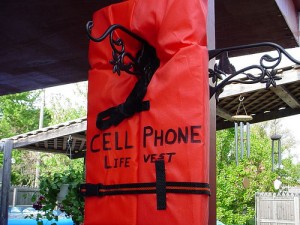 I am blogging this week for The Secure Times, the blog of the Privacy and Information Security Committee of the American Bar Association Section of Antitrust Law. Here is the first of this week’s posts.
I am blogging this week for The Secure Times, the blog of the Privacy and Information Security Committee of the American Bar Association Section of Antitrust Law. Here is the first of this week’s posts.
The Massachusetts Supreme Judicial Court ruled 5-2 on February 18 in Commonwealth v. Augustine that the government must first obtain a warrant supported by probable cause before obtaining two weeks worth of historical cell site location information (CSLI).
Defendant had been indicted for the 2004 murder of his former girlfriend. During the investigation, the prosecution filed for an order to obtain CSLI from the suspect’s cellular service provider, but the order was filed under 18 U.S.C. § 2703(d) of the Stored Communications Act (SCA). Under that law, the government does not need to show probable cause, but only needs to show specific and articulable facts showing “that there are reasonable grounds to believe that the contents of a wire or electronic communication, or the records or other information sought, are relevant and material to an ongoing criminal investigation.”
The order was granted by the Superior Court in September 2004. Defendant was indicted by a grand jury in 2011, and filed a motion to suppress evidence associated with his cell phone in November 2012.
A judge from the Superior Court granted his motion to suppress, reasoning that this was a search under article 14 of the Massachusetts Declaration of Rights – which is similar to the Fourth Amendment to the U.S. Constitution – and thus a search warrant was required.
The Commonwealth of Massachusetts appealed, arguing that the CSLI was a business record, held by a third party, and that the defendant had no expectation of privacy in this information as he had voluntarily revealed it to a third party.
This argument did not convince the Massachusetts Supreme Judicial Court, ruling instead that defendant had an expectation of privacy in the CSLI and that the prosecution therefore needed to obtain a warrant based on probable cause to obtain this information.
The Third Party Doctrine
Why did the court find that the defendant had an expectation of privacy in his CSLI, even though this information was known by a third party, his cell phone service provider?
Under the U.S. Supreme Court third party doctrine, as stated in the U.S. v. Miller 1976 case and in the 1979 Smith v.Maryland case, a defendant has no reasonable expectation of privacy in information revealed to third parties.
In Miller, the Supreme Court found that defendant has no expectation of privacy in his bank records, as they were “business records of the banks.” Similarly, in Smith v. Maryland, the Supreme Court held that installing and using a telephone pen register was not a “search” under the Fourth Amendment, and thus no warrant was required, because the defendant had no expectation of privacy in the phone numbers he had dialed.
First, the Massachusetts Supreme Judicial Court recognized article 14 of the Massachusetts Declaration of Rights affords more protection than the Fourth Amendment to the U.S. Constitution.
Then, the Supreme Judicial Court distinguished Miller and Smith from the case, finding “significant difference” between these two cases and the case at stake. The Court noted that “the digital age has altered dramatically the societal landscape from the 1970’s.”
In Smith, the defendant had taken an affirmative step when dialing the numbers which had been communicated to the prosecution by the telephone company. He had to do it in order to be able to use his telephone service. As such, Smith had “identified] a discrete item of information…like a telephone number (or a check or deposit slip as in Miller) and then transmit it to the provider.”
But cell phone users do not transmit their data to their cell phone company in order to use the service. Instead, “CSLI is purely a function and product of cellular telephone technology, created by the provider’s system network.”
The court also noted that, while using a landline may only indicate that a particular party is at home, CSLI provides a detailed report of an individual’s whereabouts. The Massachusetts court quoted the State v. Earls case from the New Jersey Supreme Court, which stated that using a cell phone to determine the location of its owner “is akin to using a tracking device and can function as a substitute for 24/7 surveillance.”
As CSLI is business information “substantively different from the types of information and records contemplated by Smith and Miller,” the court concluded that it “would be inappropriate to apply the third-party doctrine to CSLI.” However, the court added that they saw “no reason to change [their] view thatthe third-party doctrine applies to traditional telephone records.”
Obtaining CSLI from a Cell Phone Provider is a Search and Thus Requires a Warrant
The court then proceeded to answer the question of whether the government needed a warrant to access the CSLI.
As CSLI informs law enforcement about the whereabouts of an individual, the Massachusetts Supreme Judicial Court compared it to electronic monitoring devices such as a GPS. It noted that “it is only when such tracking takes place over extended periods of time that the cumulative nature of the information collected implicates a privacy interest on the part of the individual who is the target of the tracking,” quoting the Supreme Court U.S. v. Jones case, where Justice Sotomayor and Justice Alito both noted in their concurring opinions that the length of a GPS surveillance is relevant to determine whether or not the individual monitored has or does not have an expectation of privacy.
The Massachusetts Supreme Judicial Court found relevant the duration of the period of time for which historical CSLI was sought by the government. The government may only obtain historical CSLI, meeting the SCA standard of specific and articulable facts, if the time period is “too brief to implicate the person’s reasonable privacy interest,” but the two-week period covered in this case exceeds it.
The court’s ruling was about article 14 of the Massachusetts Declaration of Rights. The Supreme Court has not yet considered the issue of whether obtaining CSLI is a search under the Fourth Amendment. Since courts are split on this issue, it is likely that the Supreme Court will answer the question of whether a warrant is required to obtain cell phone location records quite soon.
Source: The Secure Times
Image is Cell Phone Life Vest courtesy of Flickr user Counselman Collection pursuant to a CC BY-SA 2.0 license.




